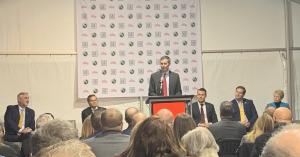
Next step for obesity drug makers replacing needles with pills
Medical experts predict the pills will be popular, especially among people who want to lose weight but are fearful of needles.

Medical experts predict the pills will be popular, especially among people who want to lose weight but are fearful of needles.

Indianapolis-based Elevance Health, which operates Anthem plans, said that in most cases, it won’t cover Ozempic unless a patient is diagnosed with diabetes and has tried another medication to manage it, but physicians can still prescribe it.

The Indianapolis-based pharmaceutical giant is spending hundreds of millions of dollars to win over patients with an extensive advertising campaign.

Groups such as the Alzheimer’s Association have pushed Medicare to cover the new Alzheimer’s drugs—including those cleared on an expedited basis—saying that the FDA should be the final arbiter of safety and efficacy of drugs.

Under the agreement, Lilly has agreed to continue its cap on out-of-pocket costs for its users at $35 a month for four years.

A judge ruled that Indianapolis-based Lilly was liable for higher payments due to its behavior in making false statements to the Centers for Medicare and Medicaid Services about the prices it charged distributors for its drugs.

If approved, Donanemab has annual multi-billion-dollar sales potential. Lilly shares rose 6% in early-afternoon trading.

Inventors and entrepreneurs who don’t have a track record face the biggest challenges, a panel of experts said Friday morning at IBJ’s Life Sciences Power Breakfast.

If approved for weight loss, Eli Lilly’s tirzepatide could become the most effective drug to date in an arsenal of medications that are transforming the treatment of obesity, which affects more than 4 in 10 American adults and is linked to dozens of diseases.
The Indianapolis-based drugmaker said it would complete submission of tirzepatide to the U.S. Food and Drug Administration in coming weeks for treatment of obesity and expects regulatory action as early as late 2023.

Worldwide sales of Baqsimi totaled $139.3 million last year, representing less than 1% of Indianapolis-based Lilly’s worldwide revenue of $28.5 billion.

The expansion will bring Eli Lilly and Co.’s total investment in the project to $3.7 billion, the most the company has ever spent on a single manufacturing site.

The Lebanon Plan Commission voted unanimously Monday to approve Eli Lilly and Co.’s development plan for its two manufacturing facilities in Boone County.

Novo Nordisk will start slashing some U.S. insulin prices up to 75% next year, following a path set earlier this month by rival Eli Lilly and Co.

Eli Lilly said the study concludes its clinical development of solanezumab, apparently shutting the door on one of the most closely watched experimental drugs over the past decade.

The Weinberg Center for Corporate Governance at the University of Delaware, a leading voice for responsible corporate leadership, has generally supported the elimination of staggered terms, saying they can lead to entrenched boards and management that fails to perform.

The Indianapolis-based drugmaker also said it will expand a program that caps patient out-of-pocket costs at $35 or less a month.

Cummins, Rolls-Royce, Eli Lilly and Co., AES and Elevance Health are among the city’s largest downtown employers and all say most of their workers have the option of working at home at least part of the time.

Jaypirca was approved to treat mantle cell lymphoma, or MCL. a rare blood cancer that starts in white blood cells in the lymph nodes for which there is no cure, according to Lilly. The disease affects about 1 in 200,000 people worldwide each year.

The move will create at least 100 new jobs at the plant, located in Research Triangle Park, the largest research park in the country.